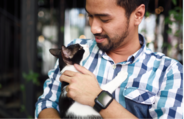Protecting Our Oceans Together
The global fish sector is vital for the food security, nutrition, and income of more than 3 billion people. However, fisheries around the world are on the verge of collapse and are under significant threat from overuse. According to the UN Food & Agriculture Organization, 1 in every 3 assessed wild fish populations have been overfished or harvested beyond their limit. Overfishing can endanger and drive species to extinction, which can reduce biodiversity. It also leads to reduced catches and lower profits. In response, some operators turn to Illegal, Unreported and Unregulated (IUU) fishing: illegal practices, lacking proper licenses or authorizations or in protected areas.
Being Part of the Solution
While our Mars Petcare business accounts for a small share of the global seafood market, as a purpose driven business, we chose to be part of the solution. In 2010, we partnered with World Wildlife Fund to set an ambitious, industry-leading target to buy 100% of the fish we use in our pet food from more sustainable sources, according to our guidelines. Over the past decade, we have been working with WWF to review, innovate and scale our approach to more sustainable fish sourcing.
We also seek to address food security by using fewer whole fish and no endangered species in our products. We are also working to advance respect for human rights within our supply chain. With support from our networks, have been working on four strategies to help us achieve these goals:
- Reduce pressure on fish ecosystems, minimizing competition with the human food supply chain, helping to address food security & not sourcing any endangered species
- Reward: seeking to source more sustainable fish, aligned with our guidelines
- Restore: collaborate to restore and safeguard critical habitats, partnering with communities to restore coral reefs in costal ecosystem and supporting Fishery Improvement Projects (FIPs)
- Respect: Advancing respect for human rights for people in the seafood industry, with a focus on Thailand
Our Journey to More Sustainable Fish Sourcing
We are proud to have made progress towards our longstanding goal to sustainably source 100% of the fish used in some of our pet food recipes. We now source 81% of the fish we use from more sustainable sources according to our guidelines. We do not source any endangered fish species according to the International Union for Conservation of Nature (IUCN) Red List of Threatened Species.

MSC and ASC sourcing progress
Measured against the most robust certifications, a WWF study found that from 2015 to 2019, we increased sourcing from The Marine Stewardship Council (MSC) certified wild-caught fisheries in key regions like Asia Pacific and Europe. Additionally, in 2019, we substantially increased sourcing from The Aquaculture Stewardship Council (ASC) certified farms, which confirms our continuous progress against these leading environmental standards.
Leading tuna conservation efforts
Through WWF, we are engaging in advocacy efforts to encourage key tuna Regional Fishery Management Organizations (RFMOs) to adopt measures that are critical to tuna conservation. Our efforts have helped drive the adoption of several key measures including a binding requirement for the use of lower-entangling Fish Aggregating Device (FAD) designs to catch tuna.
The use of these lower-entangling FADs helps to reduce the incidental catch of sharks, sea turtles, dolphinfish, billfish, and other finfish, while targeting tuna stocks. Today, the four major tuna RFMOs have adopted this requirement.
We have served on the Board of the Seafood Task Force, a leading cross-sector initiative driving sustainability in the seafood sector across Southeast Asia. We have played a leadership role in the tuna initiatives of the Task Force, helping to create and advocate for standards that boost sustainability.
Respect for human rights and the rule of law
As a board member of the Seafood Task Force (STF), a leading cross-sector initiative driving sustainability in the seafood sector in Southeast Asia, we have taken a leading role in driving measurable social and environmental change in the Thai seafood industry.
This work has focused on driving greater supply chain accountability, verification, and transparency, with an emphasis on addressing Illegal, Unreported and Unregulated (IUU) fishing.
For example, in 2018 we worked together with the Thai Union to address IUU risks by introducing digital traceability into supply chains using e-logbooks. WWF is a founding member of the Seafood Task Force and remains on the advisory council, working closely with us and other members on the social and environmental objectives and impact of the initiative.
Supporting Fishery Improvement Projects
We are committed to driving change across the fishing industry by supporting key fisheries that are committed to meeting the MSC Fisheries Standard through Comprehensive Fishery Improvement Projects (FIPs). We have worked with suppliers to source from FIPs and looking forward we will increase our level of engagement. We are now working together with WWF to identify new projects where we can provide financial support, directly engage with other organizations, and leverage our market influence for positive change.
Restoring coral reefs
We have developed a cost-effective and scalable solution to restore coral reefs called the Mars Assisted Reef Restoration System (MARRS). This method has helped restore coral reef ecosystems across two island communities in South Sulawesi, Indonesia, and off the coast of Bail., with coral cover increasing from 10% to 60% at key restoration sites. These efforts have helped rebuild a healthy, diverse, and productive coral reef, benefiting not only oceans but also the local communities that depend on them. Teams have been trained and successfully installed reef stars in the Mesoamerican Reef off the coast of Mexico, off Australia’s Great Barrier Reef, and in the Seychelles, with additional countries and locations being assessed for their suitability.



